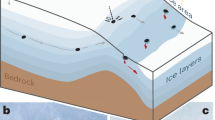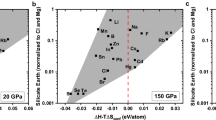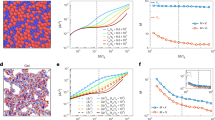Abstract
IN 1947, McDowall and Dunn1 reported the differential thermal curves for free quartz in eight New Zealand clay deposits. They pointed out that the peaks of the α–β inversion were broader than those of quartz–alumina mixtures, and that in one case a small sharp peak at 573° C. was associated with a broader one at 555–560° C., resulting in an unusual double peak. The properties of these unusual forms of quartz are further described by McDowall and Vose2.
This is a preview of subscription content, access via your institution
Access options
Subscribe to this journal
Receive 51 print issues and online access
$199.00 per year
only $3.90 per issue
Buy this article
- Purchase on Springer Link
- Instant access to full article PDF
Prices may be subject to local taxes which are calculated during checkout
Similar content being viewed by others
References
McDowall, Ian and Dunn, L. R. L., N.Z. Pottery and Ceramics Research Association, Tech. Rep. No. 1 (1947).
McDowall, Ian and Vose, W. (see preceding communication).
Trostel, L. H., and Wynne, D. J., J. Amer. Ceram. Soc., 23, 18 (1940).
Berkelhamer, L. H., U.S. Bur. Mines R.I. 3763 (1944).
Author information
Authors and Affiliations
Rights and permissions
About this article
Cite this article
FIELDES, M. Abnormal Thermal Behaviour of α-Quartz from some New Zealand Soils. Nature 170, 366–367 (1952). https://doi.org/10.1038/170366b0
Issue Date:
DOI: https://doi.org/10.1038/170366b0
This article is cited by
-
Quantitative analysis of clay minerals and their admixtures
Contributions to Mineralogy and Petrology (1966)
Comments
By submitting a comment you agree to abide by our Terms and Community Guidelines. If you find something abusive or that does not comply with our terms or guidelines please flag it as inappropriate.



